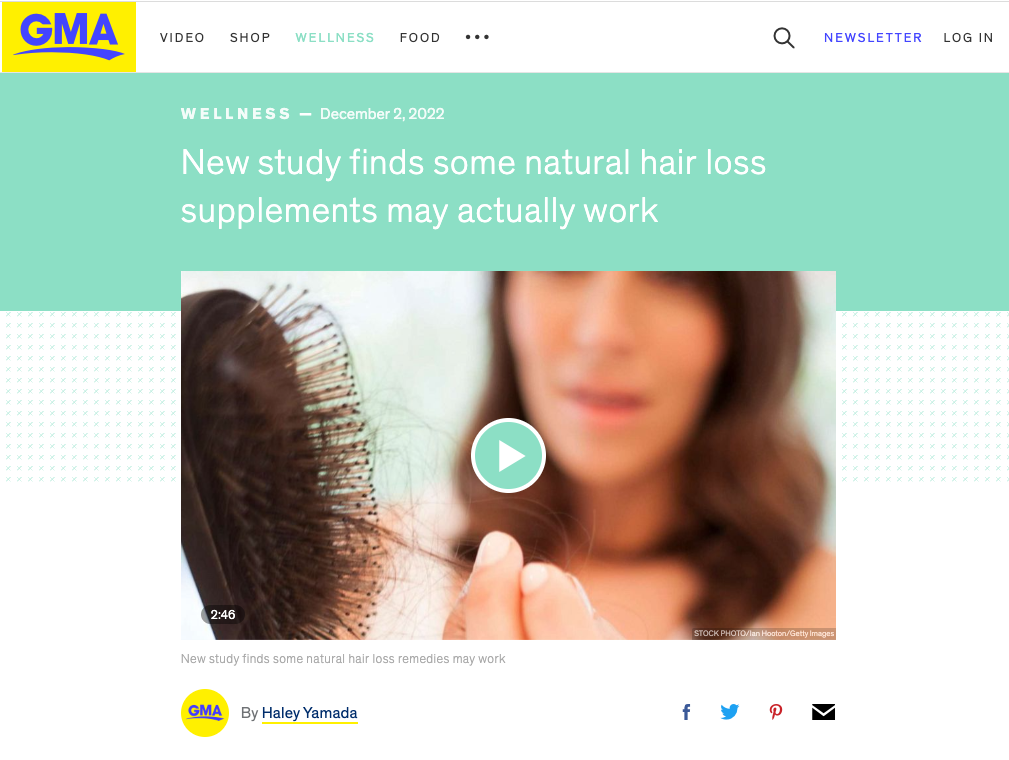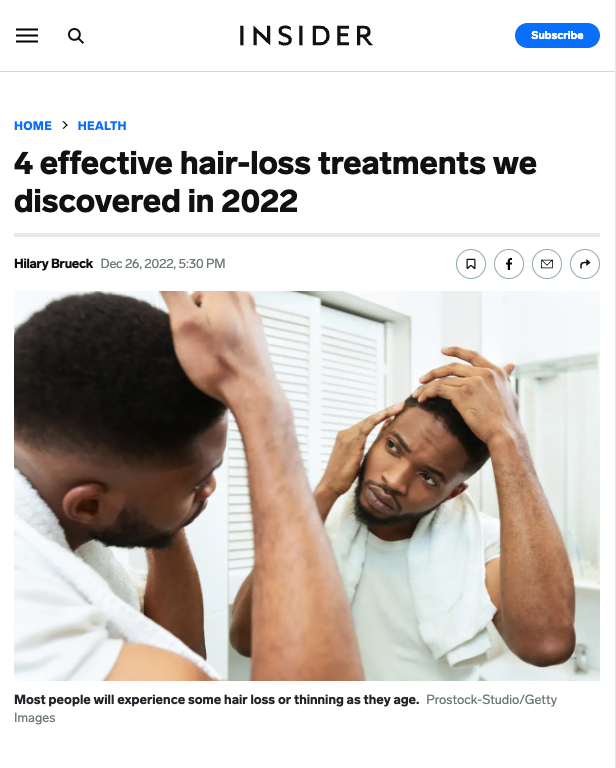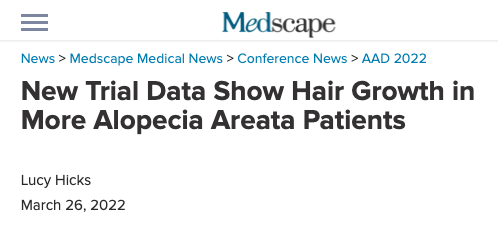Featured Findings
Evaluation of the Safety and Effectiveness of Nutritional Supplements for Treating Hair Loss: A Systematic Review
Drake L, Reyes-Hadsall S, Martinez J, Heinrich C, Huang K, Mostaghimi A.
JAMA Dermatol. 2023
Are nutritional supplements or dietary interventions safe and effective for patients with hair loss?
In this systematic review of 30 studies of nutritional interventions, the highest-quality evidence suggests the potential effectiveness of Viviscal, Nourkrin, Nutrafol, Lamdapil, Pantogar, Capsaicin and isoflavone, omega 3 and 6 with antioxidants, apple nutraceutical, total glucosides of paeony and compound glycyrrhizin tablets, zinc, tocotrienol, and pumpkin seed oil. No data for dietary interventions were identified.
The findings of this systematic review indicate that nutritional interventions may benefit select patients with hair loss, and although few adverse events were reported, physicians should engage in shared decision-making with patien
Isotretinoin Laboratory Monitoring in Acne Treatment: A Delphi Consensus Study
Xia E, Han J, Faletsky A, Baldwin H, Beleznay K, Bettoli V, Dréno B, Goh CL, Stein Gold L, Gollnick H, Herane MI, Kang S, Kircik L, Mann J, Nast A, Oon HH, See JA, Tollefson M, Webster G, Zip C, Tan J, Tapper EB, Thiboutot D, Zaenglein A, Barbieri J, Mostaghimi A.
JAMA Dermatol. 2022 Aug
What is the optimal approach to laboratory monitoring for otherwise healthy patients treated with isotretinoin for acne?
In this modified Delphi consensus study administered to 22 international dermatologist experts in acne, consensus was achieved for checking alanine aminotransferase and triglycerides at baseline and peak dose. Consensus was achieved for not checking complete blood cell count or basic metabolic panel parameters, among others.
Given the wide variation in practice patterns, these results provide data to guide clinical practice and guideline development to optimize laboratory monitoring for patients treated with isotretinoin for acne.
In The News
Other Recent Findings
Factors influencing alopecia areata treatment decisions: A qualitative assessment
Han JJ, Faletsky A, Ghatnekar S, Lee KJ, Pérez-Chada LM, Li SJ, Manjaly P, Senna MM, Huang KP, Mostaghimi A.
JAAD Int. 2022 Nov
The utility of augmented teledermatology to improve dermatologist diagnosis of cellulitis: a cross-sectional study
Creadore A, Manjaly P, Tkachenko E, Li DG, Kaffenberger B, Shinkai K, Rosenbach M, Joyce C, Mostaghimi A.
Arch Dermatol Res. 2022 Dec
Evaluation of the Safety and Effectiveness of Nutritional Supplements for Treating Hair Loss: A Systematic Review
Drake L, Reyes-Hadsall S, Martinez J, Heinrich C, Huang K, Mostaghimi A.
JAMA Dermatol. 2023 Jan
Treatment of Acne Vulgaris During Pregnancy and Lactation: A Narrative Review
Ly S, Kamal K, Manjaly P, Barbieri JS, Mostaghimi A.
Dermatol Ther (Heidelb). 2023
Variation in Medicare Part D topical steroid prescription costs
Faletsky A, Kassamali B, Han JJ, Zhao B, LaChance A, Mostaghimi A.
J Am Acad Dermatol. 2022 Nov
Use of Patient-Reported Outcomes in Acne Vulgaris and Rosacea Clinical Trials From 2011 to 2021: A Systematic Review
Ly S, Miller J, Tong L, Blake L, Mostaghimi A, Barbieri JS.
JAMA Dermatol. 2022 Dec
Development and Validation of a Simple Model to Predict the Risk of Nonmelanoma Skin Cancer on Screening Total Body Skin Examination
Hartman RI, Xue Y, Karmouta R, Tkachenko E, Li SJ, Li DG, Joyce C, Mostaghimi A.
Dermatol Res Pract. 2022 Aug
Shared Decision-Making, Therapeutic Choice, and Decisional Regret in Patients With Alopecia Areata
Reyes-Hadsall S, Drake L, Han JJ, Lee KJ, Zhou G, Mostaghimi A, Huang KP.
JAMA Dermatol. 2022 Oct
Placebo group regrowth rate in alopecia areata clinical trials: A systematic review and meta-analysis.
Han JJ, Desai S, Li SJ, Lee KJ, Mita C, Joyce C, Mostaghimi A.
J Am Acad Dermatol. 2022 Aug
Other Past Studies
November 2, 2020
Sheena Desai, BS; Priya Manjaly, BA; Karen Lee, BS; Sara J. Li, BS; Cyriac Manjaly; Megan Noe, MD, MPH; Arash Mostaghimi, MD, MPA, MPH
In this study, we performed a cross-sectional analysis of Groupon vouchers for medical imaging services in the US to evaluate the scope, pricing, customer feedback, and claims of these discount services. We found that many offerings made unsubstantiated medical claims and failed to mention the potential risks of imaging. Many customer reviews suggested upselling of additional scans at their visits and patient self-referral for scans. Our findings suggest a challenging consumerization of medicine that can put patient safety and benefit at odds with financial goals.
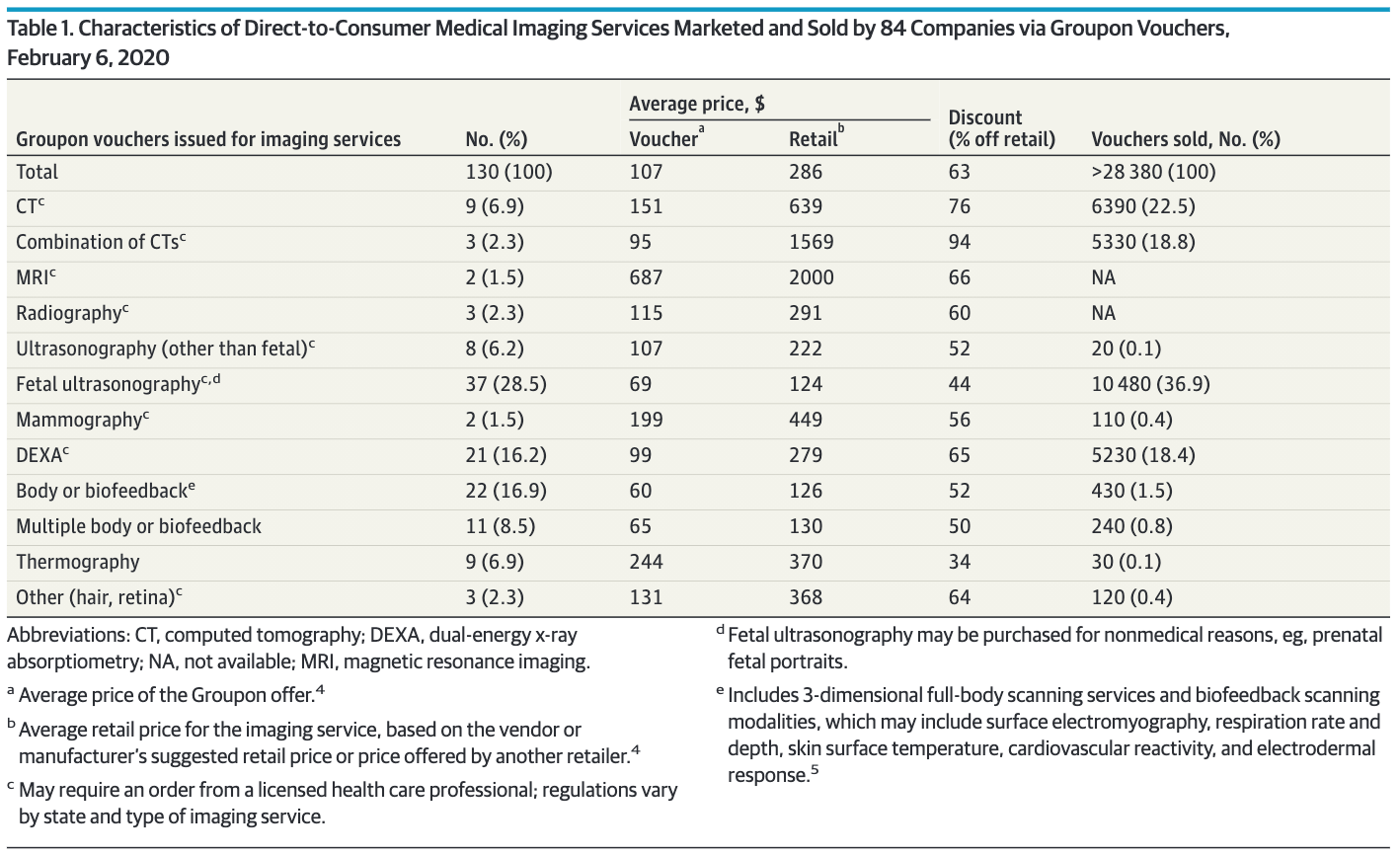
September 11, 2020
Sheena Desai, BS; Priya Manjaly, BA; Karen J. Lee, BS; Sara J. Li, BS; Cyriac Manjaly; Kathie P. Huang, MD; Arash Mostaghimi MD, MPA, MPH
In this study, we evaluate campaigns on GoFundMe.com to understand the outcomes and narratives of hair loss-related crowdfunding campaigns. Our findings demonstrate that has an immense medical and economic burden that patients seek to alleviate through crowdfunding. They also suggest suggesting that our healthcare financing systems may compel individuals to compromise privacy for support.
September 9, 2020
Andrew Creadore, BS; Priya Manjaly, BA; Sara J. Li, BS; Cara Joyce, PhD; Kathie P. Huang, MD; Arash Mostaghimi, MD, MPA, MPH
In this paper, we surveyed over 2000 people regarding their preferences as to which areas of the scalp they would prefer, if obligated, to have complete hair loss. Our results demonstrated clear patterns of hair loss preference that remained largely consistent across gender and race. These location preferences are not reflected in currently used alopecia severity scoring tools, and could contribute to the established discordance between these tools and patient quality of life.
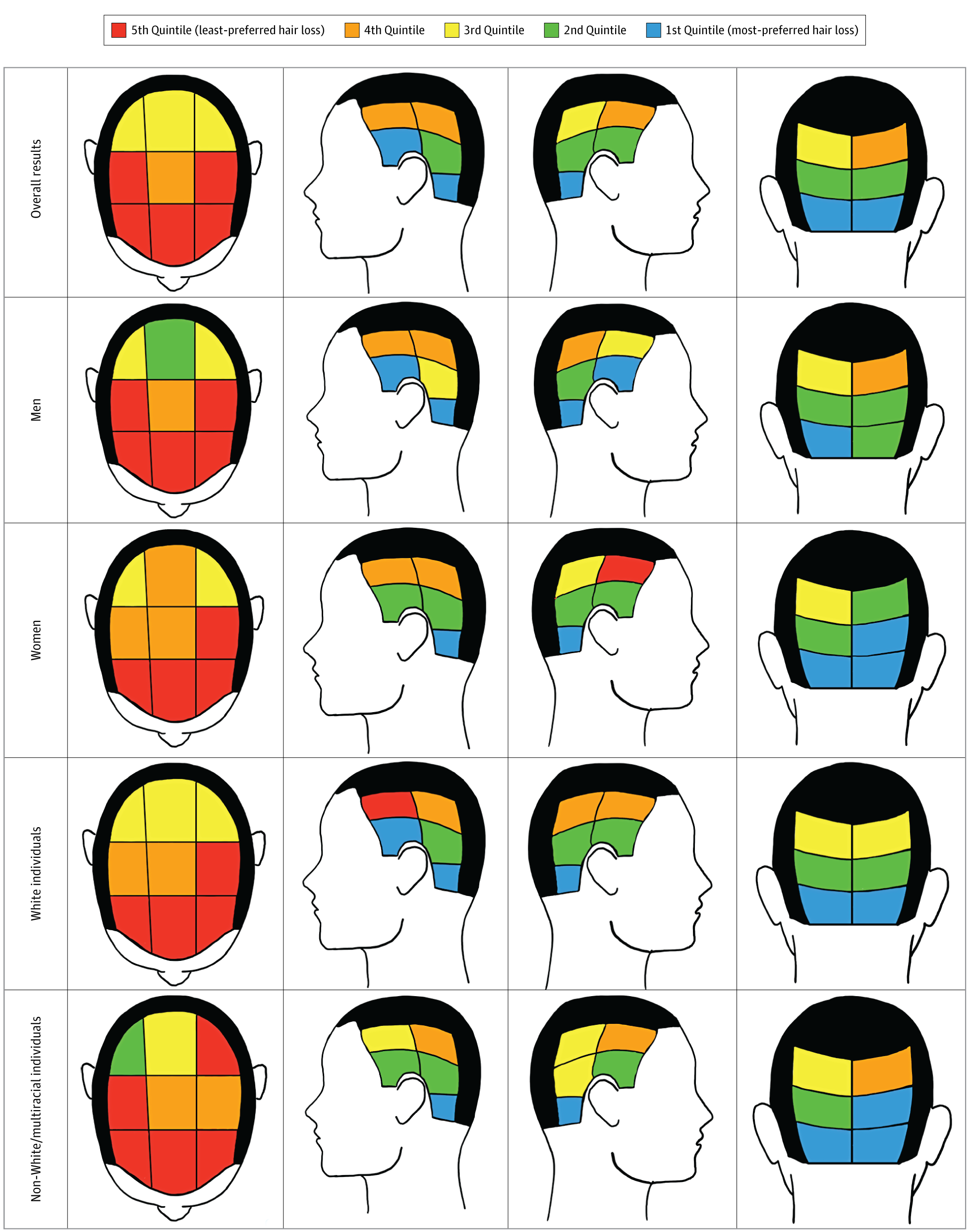
August 14, 2020
Sheena Desai, BS; Priya Manjaly BA; Karen Lee, BS; Sara J. Li, BS; Cyriac Manjaly; Arash Mostaghimi, MD, MPA, MPH
In this paper, we queried ClinicalTrials.gov to evaluate the status of interventional trials for dermatologic conditions from April 2019 through March 2020, finding that there was a significant increase in dermatology-related clinical trial suspensions, withdrawals and terminations from March-May 2020 relative to March-May 2019. Our findings provide evidence to support that dermatology-related clinical trials were disrupted due to the COVID-19 pandemic, which may have long-term repercussions on both patients and therapeutic development within dermatology.
April 20, 2020
Priyank Sharma MD; Elizabeth Tkachenko BS; Arash Mostaghimi MD MPA MPH
In this paper, we conducted a retrospective analysis of patients starting their first oral isotretinoin treatment for acne. We found that patients above 35 years old receiving isotretinoin for acne without baseline laboratory abnormalities rarely have high-risk hematologic, hepatic, or lipid abnormalities, confirming previous findings.
March 11, 2020
Patient Perspectives on the Use of Artificial Intelligence for Skin Cancer Screening
Caroline A. Nelson, MD; Lourdes Maria Pérez-Chada, MD, MMSc; Andrew Creadore, BS; Sara Jiayang Li, BS; Kelly Lo, BS; Priya Manjaly; Ashley Bahareh Pournamdari, BA; Elizabeth Tkachenko, BS; John S. Barbieri, MD, MBA; Justin M. Ko, MD, MBA; Alka V. Menon, PhD; Rebecca Ivy Hartman, MD, MPH; Arash Mostaghimi, MD, MPA, MPH
In this paper we used qualitative methods to evaluate patient’s attitudes towards artificial intelligence (AI) in dermatology. We found that overall, patients are receptive of the idea of using AI in skin cancer screenings as long as the human physician-patient relationship is preserved. Listen to Dr. Caroline Nelson, medical dermatologist at the Yale School of Medicine, discuss this topic in an interview with the JAMA Dermatology below:
Check out related editorial in JAMA Dermatology by Dr. Carrie L. Kovarik : Patient Perspectives on the Use of Artificial Intelligence
LGBT health and skin cancer risk
February 12, 2020
Association Between Sexual Orientation and Lifetime Prevalence of Skin Cancer in the United States
Sean Singer, BS; Elizabeth Tkachenko, BS; Rebecca I. Hartman, MD, MPH; Arash Mostaghimi, MD, MPA, MPH
In this paper, we found that Gay and Bisexual men to have elevated risk of skin cancer relative to heterosexual men. Lesbians with lower risk of skin cancer than heterosexual females. Listen to Dr. Mostaghimi discuss this topic with Dr. Howa Yeung in an interview with JAMA Derm below:
- NY Post: Gay and bisexual men ‘more likely’ to suffer skin cancer, study finds
- Advocate: Study: Gay, Bi Men Have Higher Skin Cancer Rates Than Straight Men
Gender Identity and Lifetime Prevalence of Skin Cancer in the United States
Sean Singer, BS; Elizabeth Tkachenko, BS; Rebecca I. Hartman, MD, MPH; Arash Mostaghimi, MD, MPA, MPH
In this paper, we show a slight increase rate of skin cancer among non gender binary patients. Check out the related editorial from Dr. Howa Yeung in JAMA Dermatology: Sexual and Gender Minority Populations and Skin Cancer—New Data and Renewed Priorities.
Mostaghimi lab
Department of Dermatology
Brigham and Women’s Hospital
Boston, MA, 02215

